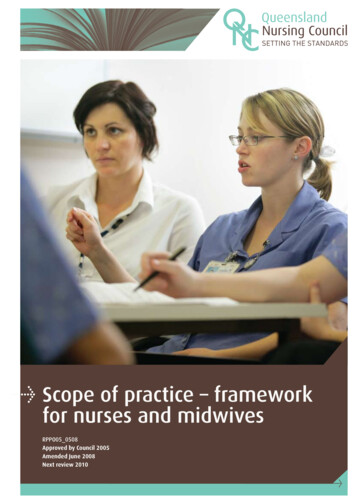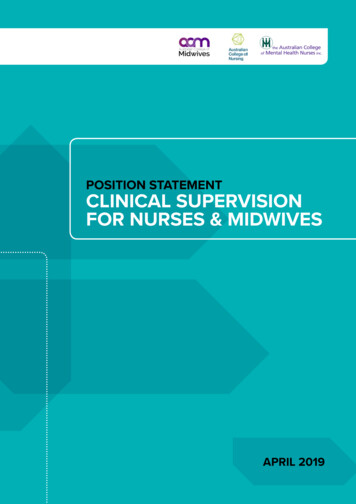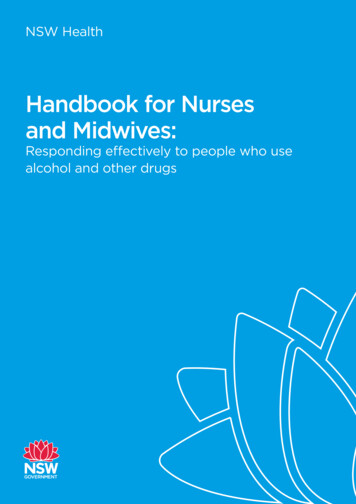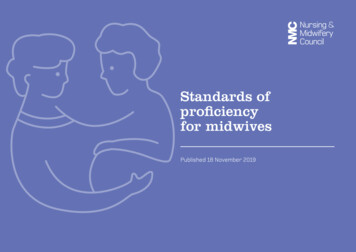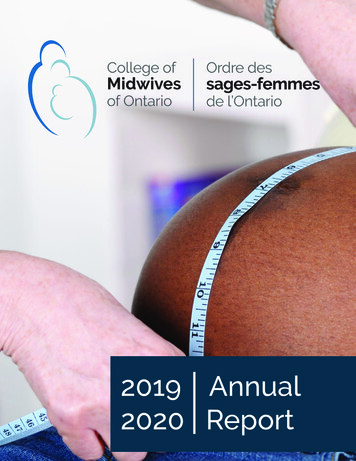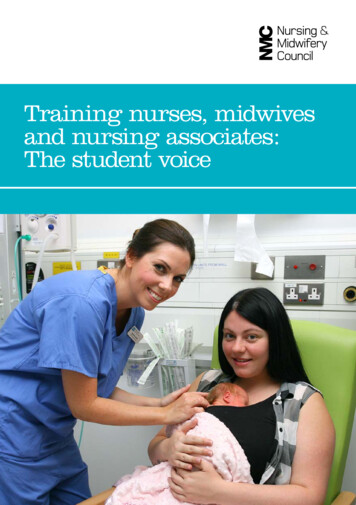
Transcription
Training nurses, midwivesand nursing associates:The student voice
Training nurses, midwivesand nursing associates:The student voiceOur role in educating student nurses, midwives andnursing associatesWe’re the independent regulator for the 690,000 nurses andmidwives in the UK and nursing associates in England.Better and safer care for people is at the heart of what we do,supporting the healthcare professionals on our register to deliverthe highest standards of care.We make sure nurses, midwives and nursing associates have theskills they need to care for people safely, with integrity, expertise,respect and compassion, from the moment they step into theirfirst job.How nurses, midwives and nursing associates are trainedNurses and midwives need a degree to practise, and this reflectshow complex and responsible their roles are. Nursing associatesrequire a foundation degree.We approve education institutions to deliver nursing, midwifery andnursing associate programmes. We currently accredit around 900programmes in over 80 education institutions across the UK andmaintain a database of all approved courses. Approved educationinstitutions recruit students and train them against our standards,assessing whether they are suitable for careers in nursing andmidwifery. Students spend half their time in the classroom and halfin healthcare settings, where they can gain real experience of caringfor patients and service users.www.nmc.org.uk2
Learning to provide good careStaff in education institutions and healthcare settings make surethat as students you are safe when caring for patients and serviceusers, and that they mentor and supervise you on your placements.As you learn, you must have access to different areas where caretakes place as this helps you progress and qualify. Above all, studentnurses, midwives and nursing associates must demonstrate theright values and behaviours and be compassionate and respectful.Joining the registerWhen you’ve successfully completed your programme, your educationinstitution will let us know whether you have met the education andpractice standards and are of good health and good character. Ifyou’re considered fit to practise you’ll then be eligible to apply to joinour register. Registration entitles you to practise in the UK. Eachyear we receive over 22,000 newly qualified nurses and midwives fromeducation institutions.www.nmc.org.uk3
How students shape educationWe’ve recently published our new standards that educationinstitutions have to meet and students’ views played an importantpart in their development. Students’ views are also taken intoaccount when education programmes are being developed.We check that this happens before we approve the programme.We also require ongoing evidence of feedback from students whenwe monitor the quality of education.We’ve developed a number of questions that students might beasked as part of our quality assurance activity:Joining your course How was your experience of applying for your course? Were service users, patients and carers involved in interviewingand selection? What was your experience of recognition of prior learning?Were you made aware prior learning can be taken into account?Were you supported by your employers in considering this process? Can you tell us what the entry requirements were for programme?How and when were you informed of those requirements? What support were you given by employers to apply to yourprogramme, if applicable?www.nmc.org.uk4
Supervision and assessment (general) Can you name your practice assessor and academic assessor?How accessible are they? How aware are you of the Standards for student supervisionand assessment being used in the programme? How is support, supervision, learning and assessment providedto you? In your view do your practice placements comply with NMCStandards for student supervision and assessment? What do you think of the way in which practice supervisorsand assessors make observations and decisions about yourperformance and give feedback? How often are you assessed? Is it mapped to the appropriatepoint in the curricula? Do you think there was a clear balance between the level ofsupervision that was provided and the stage of the programme?Did the level of supervision you were provided with reflect yourlearning needs and the stage of learning? Do you understand how and why practice and academic assessorsmight raise concerns about your conduct, proficiency andachievement when on the programme? Do your supervisors confirm that proficiencies have been met bythe end of their programme? Do your practice assessors and academic assessors communicateand collaborate at relevant points in the programme structure andstudent progression?www.nmc.org.uk5
Practice supervision Did your practice supervisors demonstrate a level of confidencein their role? Are you aware that practice supervisors need to ensure a safeand effective learning experience? Does practice supervision enhance and support independent learning? Were the supervisors who supported you all registered health andsocial care professionals, and did they have expertise relevant forthe areas of education they were providing? Did you feel that the practice supervisor who supported you wasgiven enough training and preparation to fulfil their role? Do your practice supervisors record their observations, and therelevant observations of others, in your record of achievement? Are practice supervisors appropriately experienced and qualifiedto provide the necessary support during placements?Practice assessment Have you been assigned a practice assessor? Have you got onepractice assessor for a placement or a series of placements?How were you made aware of who this individual is? What methods are used to assess your practice? Are your practice assessors prepared and supported well for theirrole as practice assessors in advance of working with students? Do your practice assessors proactively develop their professionalpractice and knowledge in order to fulfil their role as practiceassessors in advance of working with students? Did you feel your practice assessor had an understanding of yourproficiencies and programme outcomes?www.nmc.org.uk6
Do you believe that practice assessors maintain current knowledgeand expertise relevant for the proficiencies and programmeoutcomes they are assessing? What do you think of the way in which practice assessors conductassessments to confirm student achievement of proficiencies andprogramme outcomes for practice learning? Are there sufficient opportunities in the programme for practiceassessors to periodically observe you in order for decisions aboutassessment and progression to be made? Do your practice assessors demonstrate an understanding ofthe theoretical components of the programme? Have you ever been in a position where your practice assessor isalso your practice supervisor or academic assessor? Has the assessor asked for feedback from a range of peopleyou have been working with including users of services? What doyou think of your assessments? Do you think more can be doneto improve on the process or assessments?www.nmc.org.uk7
Academic assessment Do you believe that academic assessors maintain currentknowledge and expertise relevant for the proficiencies andprogramme outcomes they are assessing and/or confirming? How do academic assessors use resources such as your studentrecords to make decisions on conduct, proficiency and achievementor recommendations for progression? Do your academic assessors demonstrate an understanding ofthe practice components of the programme?Learning How do you find the learning culture at your education institutionand in the practice placements you have been in? How exposed to other professionals are you while working andlearning? Is there documentary evidence of how interprofessionalinvolvement is included in the programme? How is your engagementwith this recorded? Do you find it useful? Are you given, and supported in, opportunities for researchcollaboration? Can you provide a specific example? In your view is your programme designed to meet the standardsof proficiency and outcomes relevant to your programme? Tell me about your programme, does it comply with NMCprogramme standards specific to the programme being delivered? Do you feel that your learning time is protected, or are yousupernumerary while learning in practice? Do you feel your educators act as role models, and can you providean example?www.nmc.org.uk8
Are there sufficient learning opportunities to practice viasimulation and during practice placements? What other teachingstrategies are used? How do you feel about the structure of your programme?Does this allow you to manage your theory and learningexperience effectively and reflect the stage of the programmeyou have reached? Are you able to apply your theoretical learning to practice?Are you able to relate knowledge and convert this to skillsand procedures? How does your practice learning enable you to meet proficienciesand programme outcomes? Were the learning strategies sufficient to meet your needs?What reasonable adjustments were you provided with, if any? Do you feel that the learning delivered has helped you to achieveyour proficiencies and programmes outcomes?www.nmc.org.uk9
Personal development In what ways are you encouraged to demonstrate a commitmentto critical self-reflection and safe practice? How is this recorded? What have you learned most by self-reflection? What have youchanged as a result of self-reflection? Do you feel confident to raise mistakes and incidents you may beinvolved in? What does the duty of candour mean for you? Have you received any direct/indirect feedback from service usersand families? What have you learnt from this? Are staff helpful to you in their interpersonal skill ability,their ability to provide constructive feedback, and in theirassessment feedback? How often do you receive feedback? Is it helpful and what do youtake from it?Progression and achievement How are you assured that practice learning and supervisioncontributes to decisions around progress? Have you experienced practice assessors on this programmeworking in partnership with an academic assessor to evaluateand recommend students for progression for each part ofthe programme? Is your achievement equally balanced between theory and practice? What do you know about the Code, and how does it impact onyour learning?www.nmc.org.uk10
Are there sufficient opportunities for the practice assessor togather and coordinate feedback from practice supervisors, anyother practice assessors and relevant people, in order to beassured about their decisions for assessment and progression inyour programme? Can you explain what the health and character process means toyou as a student and what it means to declare your status?Placement What does seeking consent mean to you? How would you respondif someone did not consent to you caring for them? Who are your points of contact for the education institution andpractice placement while you are at a placement? Do they shareinformation or communicate about your learning? Have you undertaken an international practice experience, and if sowhat processes did you have to go through? Were you adequatelysupported in this learning experience, and if so how? Are you aware of any processes and checks conducted by youreducation institution to ensure the continued effectivenessand safety of your placements? Are there processes in placeto manage risks? Can you tell us about them and provide agood example? Have you worked in different practice settings? How exposedhave you been to different service users with a range of needs? What different types of communication have you used whileon placements?www.nmc.org.uk11
Resources Who leads the programme you are on? Was information about relevant local policies and processesrelevant to the programme provided clearly and was itwell signposted? Do you feel you have had access to sufficient resources, forexample to ensure practice supervision is not compromised bystaffing issues? How have any issues been responded to? Were learning support facilities satisfactory to meet yourlearning needs? How have you been made aware of the legal frameworks, suchas EU legislation, within which your programme is run? Are youfamiliar with the governance arrangements? Have you been given information on what support is available shouldyou have an interruption to your programme of study? What information have you been given about NMC registration?When you successfully complete all components of the programmeare you aware of your responsibilities to record your professionalaward with the NMC? For all of your modules undertaken so far would you describe theinduction to content, assessment, timetabling, etc as valuable andof good quality? What guidance did you receive about learning opportunities beforestarting your placement? What information have you been given regarding the minimumlength of the programme? Have you been made aware of Fitness for Practice processes?Can you describe how this process operates?www.nmc.org.uk12
What guidance and information is provided to you on the potentialimpact of criminal or civil cautions and convictions on your career?When, and how, was this information made available to you? Were milestones in practice placement clearly signpostedfor you and were they evidently reflected as stages ofproficiency development? Is the phased process towards the achievement of proficienciesand eligibility for professional and academic award, suitablysignposted and clear?Programme development and evaluation Do you contribute to programme improvement and is this promoted? What are your experiences of service user and carer contributionsto the programme? Have you had the opportunity to feed back on your programme andplacements, as well as your teachers, assessors, and supervisors? How has any feedback you’ve provided been acted on? Does your education institution provide you with as muchinformation as reasonably possible in a timely way in order tofeedback on your programme? Where programme changes areimplemented is there sufficient communication and lead-in time? Does the external examiner meet with students?Support Have you needed any support while in practice? Were the supportsystems satisfactory? Who do you go to for support at your education institution orpractice placement, and who is your named/nominated person foreach practice learning setting?www.nmc.org.uk13
How are you supported to take responsibility for your own learning? What support is available to develop your abilities in numeracy,literacy, digital and technological literacy? Weres there any personal circumstances that neededconsideration when arranging practice placement? What services are available to you to support you with physicaland mental health? Do you feel supported? How were you prepared for learning in practice and are thereadequate resources in place for this?Concerns and complaints How would you respond, and who would you approach if youhad concerns about your safety as a student, or the safety ofa patient? What support is there to raise a concern? Have you raised a concern and how was it dealt with?www.nmc.org.uk14
Diversity What information has been provided to you on equality anddiversity? What have you personally experienced in regards totreatment and support for students with different learning andsupport needs? What parts of your programme are delivered/assessed in Welsh? Do you believe that diverse needs are respected and taken intoaccount across all learning environments, with support andadjustments provided in accordance with legislative requirementsand good practice? Have you required any adjustments in your assessments due toindividual needs and if so who assessed this? If not, do you knowhow you would access these adjustments or special requirementsif you were to require this?How we monitor the quality of educationWe regularly monitor education institutions to make sure theirprogrammes continue to meet our standards and that theyeffectively manage risks such as students not having a supervisoravailable. We pass the information we collect back to educationinstitutions and share it with other regulators so that we canpromote good practice and ensure patient safety.If you have concernsIf you have concerns about your programme then you should raisethese within your education institution through the appropriatechannels. If you still have concerns that your programme isn’tmeeting our standards, or there is a risk to patient safety then youshould contact us at qateam@nmc-uk.orgwww.nmc.org.uk15
and nursing associates: The student voice Our role in educating student nurses, midwives and nursing associates . practice standards and are of good health and good character. If you're considered fit to practise you'll then be eligible to apply to join our register. Registration entitles you to practise in the UK.
